General terms & conditions
Conditions of purchase
I. General information/scope of application
1. All offers of the Contractor / the Supplier (hereinafter the Contractor) and orders of the WIAG Antriebstechnik GmbH (hereinafter referred to as the Customer) shall be effected exclusively on the basis of these General Terms and Conditions of Purchase. Any deviating, conflicting or supplementary General Terms and Conditions of Business shall not form part of the contract, even if the parties concerned are informed of them, unless consent to their validity is expressly given in writing.
2. If the Customer unconditionally accepts a delivery made by the Contractor, this does not signify that the validity of the Contractor's business conditions is also accepted and agreed.
II. Submitting of offers and orders
1. Offers made by the Contractor are binding for him and for the Customer free of charge as is the setting up of sketches, plans and the like, documents which are drafted by the Contractor.
The Contractor submitting an offer is bound to his quotation for a period of 12 weeks. The commitment period commences after the Customer has taken receipt of the offer.
Orders, particularly those placed verbally or telephonically (or by email or fax), only become binding for the Customer when the Customer has then confirmed such orders in writing. Any individual agreements remain unaffected by this ruling.
In the case of electronic ordering, such orders are also legally binding without a signature. Orders are to be accepted by the Contractor in writing within 3 working days from the order date. If confirmation is not received in time, the Customer shall be entitled to cancel the order.
Receipt of customer order is deemed accepted with the timely arrival of the declaration of acceptance at the Customer's premises.
2. In individual cases, drawings and tolerance specifications stipulated by the Customer are binding. This does not apply if the implementation of such instructions is not technically possible. In such cases the Contractor is to inform the Customer of this situation without any delay.
When confirming acceptance of the order, the Contractor acknowledges that, after having inspected the order documents, he is well informed about the type of workmanship required and the scope of the task in hand. The Customer is not bound by obvious mistakes, typographical errors and miscalculations in the documentation and drawings submitted by the said Customer. The Contractor shall be obligated to inform the Customer about such errors immediately so that the order can be corrected. This also applies in the case of any missing documents.
The Contractor is subsequently liable for any delays occurring during the execution of the order, which are caused as a result of non-compliance with these provisions, provided that he is responsible for the given situation.
3. Furthermore, during the production process the Contractor remains obligated to check progress in accordance with customer-specific stipulations and monitor whether the technical specifications stated in the order correspond to the documents in the hands of the Contractor. The Customer is in no way obliged to accept deliveries of goods which do not correspond to the order.
Early deliveries are, as a matter of principle, not permitted. Should any one order have no stipulations regarding the delivery time, then this, in the absence of a special written agreement, is to be carried out immediately following conclusion of the contract. This also applies to orders based on delivery and service specifications of the Contractor, even if this denotes different delivery periods. Any deviating delivery times requested by the Contractor are only relevant and acceptable if expressly approved in writing by the Customer. Calculations regarding agreed delivery deadlines (commencement) are governed by the date when the order was officially received.
If the Customer makes available material to the Contractor for the purpose of processing, then the Contractor is obliged to carry out the relevant checks on this in accordance with Section 377 of the HGB, the German Commercial Code.
In instances where the Customer provides the Contractor with the Customer's own services or materials for the provision of services, the Contractor shall be obligated to check and verify, without delay, the functionality, the quantity and the visible absence of defects and flaws (no damage incurred during transport etc.) in such material.
These checks are to be run immediately after acceptance of the service or receipt of the articles. The providing of such services or items does not affect the warranty obligations of the Contractor.
4. The Contractor is obliged to obtain the necessary authorisation for the execution of services in advance.
III. Prices and terms of payment
1. The prices stated in the orders are binding and cover free delivery including all additional costs such as packaging, insurance, etc. Insurance cover up until receipt of goods is to be arranged and guaranteed by the Contractor,
provided that no other arrangements have been agreed.
The statutory value-added tax applicable is to be shown in offers and on invoices as a separate sum. Insofar as the price, in line with the agreement made, does not include packaging and the payment for the packaging - not only that available on loan - and if it has not been specifically stated, then this has to be calculated at the verifiable cost price. Should the Customer so wish and request, the Contractor is obliged to take back the packaging at his own expense.
2. Should the Customer be prevented from accepting goods as a result of acts of God, industrial disputes, disruption of operations for which he is not responsible and other events beyond his control, the claims of the Contractor for compensation or damages are excluded provided that the Customer was not aware or could not have been aware of the problem when the contract was concluded. In such a case, the Contractor shall store the goods at his own expense and at his own risk until the Customer can take possession of the goods in question.
3. The Customer pays within 14 days with a 3% discount or makes a net payment within 30 days, in both cases following receipt of the invoice and the due and proper receipt of the goods, i.e. provided no other arrangements have been agreed in writing.
Partial deliveries, although they are permissible in exceptional cases, are excluded from the discount period arrangement. Proof of the transfer order at the Customer's bank suffices to meet the timely payment of monies owed by the Customer.
4. The Customer is entitled to rights of offsetting and retention as permitted by law. The Contractor is only entitled to a form of offsetting if his counterclaims can be legally ascertained, if they are beyond dispute or if they are accepted by the Customer. The right of retention is also granted to the Contractor as permitted by law, provided that his counterclaim is based on the same contractual relationship.
5. The order number, the article number, the warehouse order number (if available), the quantity to be delivered and the delivery address are to appear in all order confirmations, delivery documents and invoices. Should one or several of these details be missing and consequently the processing of the usual business transactions be delayed as a result of the Customer's incomplete information, the payment deadlines stated in Paragraph 3 are extended by the period of delay.
IV. Delivery and delivery periods
1. The delivery time (delivery date or delivery period) stated in the order is binding.
2. The Contractor shall be obligated to deliver goods within the period that appears on the order document. The delivery date has been met when the goods have arrived at the place of receipt stated by the Customer. Any possible additional costs incurred in order to observe the delivery date are to be borne by the Contractor. Partial deliveries are only permitted following a written agreement; if this is not the case, the Customer can refuse to accept incomplete quantities of merchandise.
3. If delays are to be expected despite the fixing of a delivery time, the Contractor shall immediately inform the Customer of this verbally or telephonically and then finally in writing. The Customer's decision as to whether he wishes to continue with the order is also to be questioned and clarified. The reporting of an expected delay in delivery does not change the agreed delivery date. The unreserved acceptance of a delayed delivery does not signify any waivering of claims for compensation for which the Customer is eligible as a result of the delayed delivery or service. If neither the delivery date nor a reasonable extended deadline granted by the Customer is kept, the Customer is entitled at his discretion either to withdraw from the contract and/or claim compensation on account of breach of contract. Moreover, the Contractor shall reimburse the Customer for all additional costs incurred on account of the delayed delivery or service. Further legal claims remain unaffected.
4. Should the Contractor default in conjunction with Section 286 of the BGB, the German Civil Code, the Customer shall have the right to claim a penalty of 1% of the gross value of the order for every full week of the delay, but only to a maximum of 10% of the gross value of the order. The Customer is entitled to claim this penalty in addition to his claim for performance. The contractual penalty will be credited towards the customer's claims for compensatory damages. Further claims of the Customer remain unaffected.
5. If the Contractor is unable to meet a delivery date as a result of a force majeure, he is to inform the Customer of the situation immediately. In such a case, the Customer is justified in extending the period of acceptance or, if he is consequently much less interested in receiving the delivery, he is entitled to withdraw from the contract completely or partially or he has the option of reducing the purchasing price.
6. The provisions relating to fixed-period commercial transactions as stated in Section 376 of the German Commercial Code remain unaffected.
7. The Customer is not obliged to accept goods prior to expiry of the delivery deadline.
8. The contents of the consignment including the article numbers and article descriptions are to be clearly labelled and in such a way as to be easily visible. All commercial documents are to be enclosed in the delivery.
9. As a manufacturing business with production deadlines to meet, the Customer is particularly reliant on punctual deliveries. Even if the tiniest part or a necessary certificate is missing, it can mean that major manufacturing and delivery delays result leading to losses which greatly exceed the order value.
V. Acceptance
1. The Customer is only then bound to accept ordered goods if they correspond to the instructions given by the Customer regarding goods specifications and quality, or, alternatively, if they correspond to a sample authorised by the Customer.
2. Tool test certificates have to arrive with each delivery or are to be sent on without delay, depending on arrangements agreed.
3. The Customer can reject orders which do not correspond to agreements regarding delivery periods and the scope of delivery. Costs incurred in this respect shall be borne by the Contractor.
4. Receipt of goods can only be carried out in accordance with details stated in our order or in line with instructions on a separate written communication.
VI. Transfer of risks and title
1. Delivery and dispatch are effected at the cost and risk of the Contractor to a place of receipt designated by the Customer.
The Contractor is obligated to deliver the goods, freight and expenses prepaid, to the place of receipt fixed by the Customer, a location which is simultaneously the place of performance. Even if dispatch has been agreed, the risk only passes to the Customer when the goods are handed over to the Customer at the agreed place of destination.
Legal regulations governing transfer of risk remain unaffected by this ruling.
2. The Customer only accepts a simple retention of title agreement. As a corollary, the Customer refuses to accept an extended retention of title clause. Upon payment of the purchasing price at the latest, ownership of the delivered goods passes from the Contractor to the Customer.
3. The Customer can, within the scope of normal business activities, mix, process and blend the Contractor's goods which are subject to retention of title and then resell them for his own purposes.
VII. Warranties
1. The Contractor ensures that the goods delivered correspond to those described in his offer.
In case of deliveries or orders based on samples or specimens, the properties and specifications of the sample and the specimen are deemed to be the required quality characteristics.
2. The Contractor pays particular attention to see that his goods delivery and his services guarantee the following: the recognised rules of all things technical, statutory safety regulations and all other manner of stipulations, the agreed technical, chemical and physical data including all other agreed characteristics or those stated by the Contractor or defined by a different manufacturer also involved. Generally accepted standards, especially DIN, ISO, VDI, VDE etc., are to be observed, provided that higher standards are not required resulting from state-of-the-art developments, the deployment location stated, the intended use or any other instructions given by the Customer. Further legal or contractual guarantee obligations on the part of the Contractor remain unaffected.
3. On receipt of goods, the Customer will check the articles himself and as regards the following aspects: the quantity, the type of goods, possible transport damage clearly visible on the outer packaging and also any defects on the goods themselves which are outwardly apparent. A claim regarding defects is deemed to be timely if it is made within a period of seven calendar days following receipt of goods or, in the case of hidden defects, if the claim is lodged upon discovery of the fault.
4. The Customer shall be entitled to the statutory warranty claims in full; in every case the Customer shall be justified in demanding from the Contractor either the remedying of the defect or the supplying of a new product. The Customer can limit his rescission to the faulty part of a delivery or claim rescission with regard to the entire delivery. The Customer's right to assert claims for damages remains reserved.
5. In urgent cases or should the Contractor be behind schedule as regards the fulfilling of his obligatory guarantee, then the Customer is entitled to remedy the faults himself or to have them remedied - both options at the expense of the Contractor - or, alternatively, to procure a replacement also at the expense of the Contractor.
6. The Contractor's warranty period is 36 months commencing from the delivery of the consignment.
7. The Customer is at liberty to return faulty goods carriage forward. If the transfer of risk took place no longer than six months ago, it can be assumed that any possible fault was already in existence at the time of the transfer of risk.
8. The Contractor's regular limitation period for performance and damages claims directed against the Customer is 24 months. Regulations stated in Sections 196 and 197 of the BGB, the German Civil Code, shall remain unaffected by this.
9. The rulings in Paragraph 8 do not apply if the Customer's liability is caused by intent or malice or gross negligence. Moreover, they are also not applicable for claims made against the Customer appertaining to the Product Liability Act and for claims for compensation lodged against the Customer, which are brought about by injury to life, limb, health or freedom of a person. In such cases, liability and limitation periods comply with statutory regulations.
10. With replacement deliveries and the remedying of defects, the warranty period for replaced and repaired items recommences unless the Customer, in the light of the Contractor's behaviour, was compelled to assume that the latter did not consider himself obliged to carry out such measures but only sent replacements or remedied faults as a gesture of goodwill or for similar reasons.
11. Insofar as poor and inadequate performance of the Contractor can be traced back to the poor and inadequate performance of a Subcontractor or of a Supplier of the Contractor, the Contractor shall assign to the Customer warranty claims against the Subcontractor or Supplier and also tortious claims for damages on account of the said inadequate performance. This assignment is made in order to secure the Customer's warranty rights against the Contractor. The fulfilment of the Customer's claims against the Contractor is not combined with this assignment, which is undertaken purely by way of security. On receipt of these claims and during their enforcement, the Contractor shall support the Customer to the best of his ability and permit him, the Customer, to pursue such claims. Up until the disclosure of the assignment by the Customer, the Contractor remains entitled and obligated to assert claims against the first-tier suppliers and subcontractors concerned, on his own behalf and at his own expense. After the satisfying of the Customer's warranty claims against the Contractor, the Customer will then once more transfer back the Contractor's warranty claims against first-tier suppliers or subcontractors. Should an overcollateralisation of the Customer's warranty claims result by more than 20% beforehand, then the Customer, at the Contractor's request, is obliged to reassign to the Contractor the surplus part of the Contractor's warranty claims exceeding 120% of the claim.
VIII. Property rights
1. The Contractor is responsible for ensuring that his deliveries to the Customer in no way violate patent rights or property rights of third parties within the Federal Republic of Germany or, as far as the Contractor is aware, within the country of destination determined for delivery of the goods. The Contractor releases the Customer from the possible violation of such property rights. The Customer's indemnity obligation refers to all claims, including claims for damages which inevitably arise for the Customer resulting from or in connection with a claim asserted by a third party.
2. With the delivery of a piece of work protected by copyright, the Contractor provides the Customer with a simple and unrestricted usufruct throughout all types of use.
IX. Product liability
In the case of product liability, the following applies irrespective of all other claims of the Customer:
1. The Contractor is responsible for all claims asserted by third parties as regards injury to persons or damage to material if these claims can be attributed to a faulty product delivered by the said Contractor. The Contractor is also obliged to release the Customer from all liability ensuing from such claims. In cases of fault-based liability, this, however, only then applies insofar as the Customer has acted culpably. If the cause of damage can be found in the Contractor's area of responsibility, he bears the burden of proof to the appropriate extent.
2. In the context of this liability, the Contractor is also obligated to reimburse expenses and losses accrued to the Customer resulting from or in conjunction with a product recall action carried out by the Customer. As far as is possible and, in specific cases, as far as is reasonable, the Customer shall inform the Contractor of such actions and grant him an opportunity to comment on the situation.
Any legal costs consequently incurred shall also be borne by the Contractor.
The Contractor shall be obliged to support and assist the Customer.
3. The Contractor shall be obligated to maintain at his own expense product liability insurance with a level of coverage of at least 2.5 million euros. Should the Customer so wish, the Contractor is to send the Customer a copy of the liability policy at any given time.
X. Models and drawings
1. The models, samples and drawings handed over to the Contractor at the placing of the order - provided that nothing has been otherwise agreed - remain the property of the Customer. These may not be passed on to third parties or used in any other way. On termination of the contract or completion of the supply relationship, these documents and samples are to be returned to the Customer immediately and without any particular prompting.
2. Tools, devices and other objects made or obtained by the Contractor but financed by the Customer become the property of the Customer during the course of their acquisition. They will be carefully kept by the Contractor for the Customer free of charge, they will be kept in good order and repair and renewed so that they can be used at any time.
The Contractor insures these tools and devices at their original value against damage by fire, water and theft and does so at his own expense. The Contractor already now assigns any possible claims for compensation against the insurance to the Customer accepting this assignment.
3. Tools, devices and models which the Customer makes available to the Contractor or those which are made for contract purposes and calculated separately for the Customer by the Contractor remain the property of the Customer or they become his property. The Contractor shall mark these objects clearly as the property of the Customer, he is to keep them safe, protect them from all kind of damage and only use them for contractual purposes. Costs for the maintenance and repair of these items shall be borne equally by the contractual partners - i.e. in the absence of any other arrangement. However, insofar as these costs can be attributed to defects in such objects manufactured by the Contractor or to improper use of such objects on the part of the Contractor, his staff or other agents, then the costs shall be borne entirely by the Contractor. The Contractor will give notification immediately of any not merely insignificant damage done to these objects. Upon request, the Contractor is obligated to return these objects in a fit and proper condition to the Customer if such items are no longer needed for the fulfilling of contracts drawn up with the Customer.
4. The Customer reserves copy and proprietary rights to all orders and commissions submitted by the Customer and also to all drawings, sketches, calculations, descriptions and other documentation made available to the Contractor. The Contractor is not permitted to make any of this information accessible to third parties, he is not permitted to divulge their contents, use them himself or through third parties or reproduce them without the express consent of the Customer. If so requested by the Customer, the Contractor shall return these documents in their entirety to the Customer if they are no longer needed by him in the normal course of his business or if negotiations do not lead to the concluding of a contract. In such a case, any copies which might have been made by the Contractor are to be destroyed. The only exception to this ruling is the safekeeping of material in line with statutory storage obligations and the saving of data for backup purposes as part of usual data storage practice.
XI. Retention of Title
1. In the case of a delivery of material to the Contractor for further processing, the Customer reserves title to such material. The Contractor is only permitted to use this material for orders placed by this Customer. In the event of any loss or damage to the material, the Contractor is liable to the Customer.
2. It is agreed that the Customer becomes co-owner of the products manufactured from the material and parts supplied in proportion with the relation between the value of the materials provided and the value of the entire product. This applies insofar as such products are held in safekeeping by the Contractor for the Customer.
XII. Spare Parts
1. The Contractor shall inform the Customer at least 6 months in advance if any changes to spare parts are made, for example as a consequence of state-of-the-art developments.
2. The Contractor is obliged to stock spare parts needed for products supplied to the Customer for a period of at least (10) years after delivery of goods.
3. Should the Contractor decide to discontinue production of spare parts of products supplied to the Customer, he is to inform the Customer of this cessation immediately after taking such a decision. This notification must - subject to Paragraph 2 - take place at least 12 months prior to cessation of production.
4. If the Contractor is no longer in a position to supply spare parts, whether as a result of justifiable or not justifiable circumstances (e.g. insolvency), he, in consultation with the Customer, shall assure the providing of the necessary capacities by third parties and shall be obliged to grant licences and offer technical support. Conditions agreed between the contractual parties also apply for deliveries regarding the spare parts market.
XIII. Trade secret confidentiality
1. The Contractor shall be obligated to treat the Customer's orders, technical details such as illustrations, drawings, calculations and all manner of documentation as confidential trade secrets of the said Customer.
2. These matters may only be disclosed to third parties with the Customer's express written consent. This obligation to secrecy also applies after the completion of the contract. It lapses if and insofar as a business secret has become generally known.
3. Without first having received written permission, the Contractor is not permitted to mention his business connection with the Customer in advertising material, brochures and the like, nor is he allowed to display goods manufactured for and delivered to the Customer.
4. In the event of a breach of this provision, the Contractor is to compensate the Customer for any loss or damage incurred as a result of this contractual violation.
XIV. Liability
In the event of any possible claims for damages, the Customer is liable to the Contractor in the case of wilful intent, gross negligence and liability for any damage resulting from injury to life, limb or health. In a case of simple carelessness, liability for other kinds of damage is limited to foreseeable damage typical of the contract concerned.
XV. Transfer of contracts
The Contractor shall not be entitled to pass on his obligations resulting from this contract or indeed essential parts of the order to third parties without first obtaining the written consent of the Customer.
XVI. Data protection
The Customer shall be entitled to process data on the Contractor, also information held in electronic files, referring to the business terms and conditions or data in conjunction with these conditions, irrespective of whether this information comes from the Contractor himself or from a third party, all of which being subject to the regulations of data protection.
XVII. Withdrawal
Irrespective of the legal right of withdrawal, the Customer shall be entitled to withdraw from the contract, particularly in the case of repeated failure to meet agreed delivery dates. The same applies if payments are suspended or an application is filed for insolvency proceedings or such proceedings are opened.
XVIII. Assignment, exclusion of set-off rights
1. The Contractor shall not be entitled to assign his claims arising out of the contractual relationship to third parties.
2. If the Customer is entitled to payment claims against the Contractor, the Contractor can only then offset such claims if the Contractor's counterclaim is undisputed or has been legally determined.
XIX. Place of performance and legal venue
1. The place of performance for services to be provided by the Contractor is the place of delivery stipulated by the Customer. This place of performance is incidentally also the business headquarters of the Customer in Lippstadt/Germany.
2. The sole court of jurisdiction for all disputes arising from this agreement - irrespective of their legal grounds - is the Customer's head office in Lippstadt/Germany. However, for legal actions against the Contractor, the Customer is entitled to choose the court applicable for the Contractor's headquarters or the one applicable for the relevant branch of his company. The laws of the Federal Republic of Germany apply exclusively to all legal relationships between the contractual parties.
3. The application of uniform, international UN sales law (CISG) is excluded.
XX. Severability clause
Should one of the aforementioned provisions be or become ineffective, the validity of the remaining contractual stipulations shall remain unaffected. The ineffective contractual stipulation shall be replaced by one which most closely approximates the commercial intent and purpose of the said stipulation. The same applies in the event that these stipulations have any omissions or that they require interpretation.


 Timing belts
Timing belts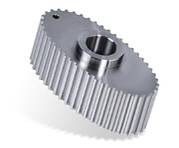 Pulleys
Pulleys Gears
Gears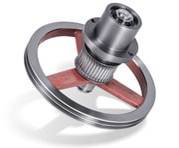 Assembly units
Assembly units Sprockets
Sprockets V-belt pulleys
V-belt pulleys V-belts
V-belts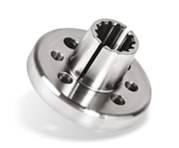 Metal cutting
Metal cutting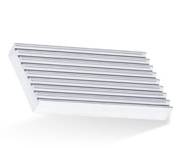 Machine parts
Machine parts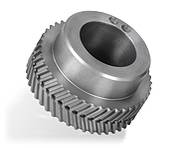 SilentSync Tooth Lock Washers
SilentSync Tooth Lock Washers Sawing
Sawing Turning
Turning Milling
Milling Gearing
Gearing Eroding
Eroding Grinding
Grinding Gear grinding
Gear grinding Mounting
Mounting Heat treatment
Heat treatment Surface treatment
Surface treatment Quality assurance
Quality assurance Logistics
Logistics